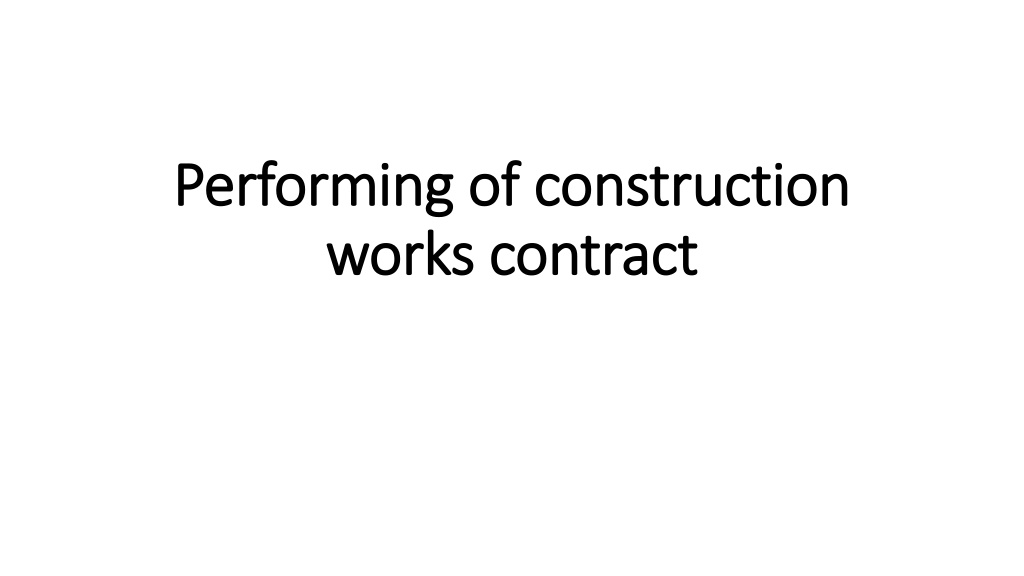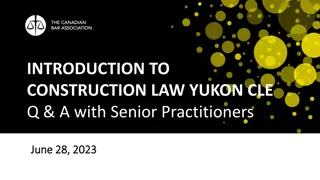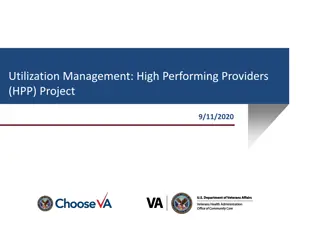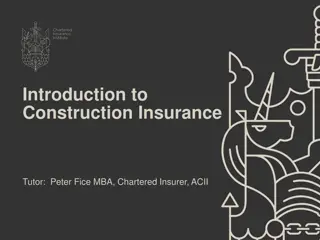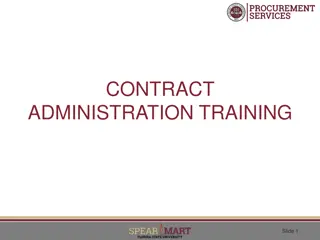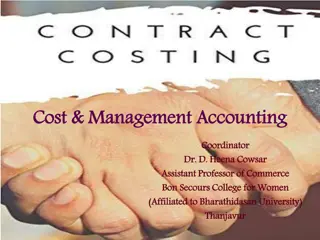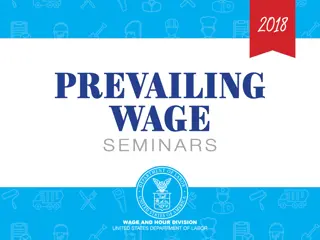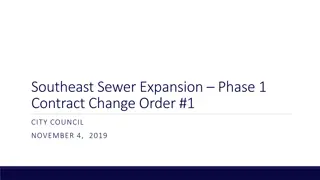Performing of construction works contract
In the realm of construction contracts, key aspects such as the performing of construction works, scope of construction works, commencement procedures, duration of performance, and time frame for completion play pivotal roles. The contractor's commitment to delivering the project in line with the design and technical specifications, along with the investor's obligations, are crucial for seamless project execution. Understanding the obligations, timelines, and processes outlined in the construction contract is essential for successful project completion.
Download Presentation

Please find below an Image/Link to download the presentation.
The content on the website is provided AS IS for your information and personal use only. It may not be sold, licensed, or shared on other websites without obtaining consent from the author. Download presentation by click this link. If you encounter any issues during the download, it is possible that the publisher has removed the file from their server.
E N D
Presentation Transcript
Performing of construction Performing of construction works contract works contract
Performing of construction works contract Performing of construction works contract Art. 647 CC By a construction works contract, the contractor commits to hand over the facility provided for in the contract performed in accordance with the design and technical know-how, and the investor commits to carry out the actions required by the relevant regulations to prepare the works, especially to hand over the construction site and to deliver the design and to accept the facility and pay the agreed remuneration. subject of the contract of construction work: performing construction work remuneration
SCOPE OF CONSTRUCTION WORKS Art. 649 CC Scope of works In case of doubt, it is deemed that the contractor has undertaken to perform all the works covered by the design constituting a component part of the contract.
COMMENCEMENT OF CONSTRUCTION WORKS 8.1 FIDIC Commencement of Works The Engineer shall give a Notice to the Contractor stating the Commencement Date, not less than 14 days before the Commencement Date. Unless otherwise stated in the Particular Conditions, the Commencement Date shall be within 42 days after the Contractor receives the Letter of Acceptance. The Contractor shall commence the execution of the Works on, or as soon as is reasonably practicable after, the Commencement Date and shall then proceed with the Works with due expedition and without delay.
DURATION OF PERFORMANCE OF CONSTRUCTION WORKS DURATION OF PERFORMANCE OF CONSTRUCTION WORKS Art. 488 CC Simultaneous performance. 1. Performances which are the object of obligations under reciprocal contracts (reciprocal performances) should be made simultaneously unless it follows from the contract, the law, a decision of a court or other competent authority that one of the parties is obliged to make an earlier performance. 2. If reciprocal performances are to be made simultaneously, each party may withhold the performance until the other party offers the reciprocal performance. Art. 457 CC Stipulation of time to the debtor's benefit. The time for a performance specified by a legal act is deemed, in case of doubt, as stipulated to the benefit of the debtor.
TIME FOR COMPLETION OF CONSTRUCTION WORKS TIME FOR COMPLETION OF CONSTRUCTION WORKS 8.2 FIDIC Time for Completion The Contractor shall complete the whole of the Works, and each Section (if any), within the Time for Completion for the Works or Section (as the case may be), including completion of all work which is stated in the Contract as being required for the Works or Section to be considered to be completed for the purposes of taking over under Sub-Clause 10.1 [Taking Over the Works and Sections].
PERFORMING CONSTRUCTION WORKS
PERFORMING CONSTRUCTION WORKS Art. 354 CC 1. A debtor should perform his obligation in accordance with its substance and in a manner complying with its social and economic purpose and the principles of community life, and if there is established custom in this respect - also in a manner complying with this custom. Art. 355 CC 1. A debtor is obliged to use the care commonly required in relations of a given type (due care). 2. The due care of a debtor in his business activity is specified with consideration taken of the professional nature of this business.
PERFORMING CONSTRUCTION WORKS COOPERATION IN THE PERFORMANCE OF AN OBLIGATION Art. 354 CC 2. The creditor should cooperate in the same manner in the performance of an obligation. Art. 362 CC Contribution to damage If an aggrieved party has contributed to damage arising or increasing, the obligation to remedy the damage is appropriately reduced according to the circumstances, and especially to the degree of both parties' fault. Art. 431 PPL The contracting body and the economic operator selected in the procurement procedure shall be obliged to cooperate in the performance of a public contract, hereinafter referred to as the contract , in order to properly perform the contract.
PERFORMING CONSTRUCTION WORKS COOPERATION IN THE PERFORMANCE OF AN OBLIGATION Art. 651 CC Notification of obstacles. If the documentation, the construction site, the machines or the equipment supplied by the investor are not suitable for proper performance of the works or if other circumstances occur which may hinder the proper performance of the works, the contractor should immediately notify the investor thereof. Art. 634 CC Notifying obstacles. If the material delivered by the orderer is not suitable for the proper performance of the specific work or if other circumstances occur which may hinder the proper performance, the person that accepted the order should immediately notify the orderer thereof.
PERFORMING CONSTRUCTION WORKS COOPERATION IN THE PERFORMANCE OF AN OBLIGATION Art. 655 CC Risk of destruction of a facility. If a facility is destroyed or damaged as a result of defective materials, machines or equipment supplied by the investor or as a result of work being performed in accordance with the investor's instructions, the contractor may demand the agreed remuneration or an appropriate part thereof if he had warned the investor of the risk of destruction of or damage to the facility beforehand or if, despite having used due care, he could not have determined that the materials, machines or equipment supplied by the investor were defective.
PERSONAL PERFORMANCE OF PERSONAL PERFORMANCE OF THE CONTRACT OF THE CONTRACT OF CONSTRUCTION WORKS CONSTRUCTION WORKS
PERSONAL PERFORMANCE OF THE CONTRACT PERSONAL PERFORMANCE OF THE CONTRACT OF CONSTRUCTION WORKS OF CONSTRUCTION WORKS RESERVE OF PERSONAL PERFORMANCE OF THE CONTRACT Art. 60 PPL The contracting body may reserve an obligation to perform key tasks by individual economic operators jointly competing for the contract, in relation to: 1) contracts on works or services; 2) siting and installation operations, under the contract for supplies. Art 121 PPL The contracting body may reserve the obligation for the economic operator to perform itself the critical tasks relating to: 1) works or service contracts, or 2) siting and installation operations under the supply contract.
PERSONAL PERFORMANCE OF THE CONTRACT PERSONAL PERFORMANCE OF THE CONTRACT OF CONSTRUCTION WORKS OF CONSTRUCTION WORKS RESERVE OF PERSONAL PERFORMANCE OF THE CONTRACT Art. 356 CC Performer. 1. A creditor may demand personal performance by the debtor only if the same follows from the substance of the legal act, the law or the nature of the performance. 2. If a monetary claim is due and payable, the creditor cannot refuse to accept performance from a third party even if the latter acts without the debtor's knowledge.
PERSONAL PERFORMANCE OF THE CONTRACT PERSONAL PERFORMANCE OF THE CONTRACT OF CONSTRUCTION WORKS OF CONSTRUCTION WORKS LIABILITY FOR SUBCONTRACTORS Art. 474 CC Liability for other persons. A debtor is liable, as for his own actions or omissions, for the actions and omissions of persons with the assistance of whom he performs the obligation, and of the persons to whom he entrusts the performance of the obligation. The above provision also applies where the obligation is performed by the debtor's statutory representative. Art. 7 pkt. 27 PPL a subcontract shall mean a written contract concluded between the economic operator and the subcontractor and, in the case of a contract for works other than from the fields of defence and security, also between the subcontractor and further subcontractor or between further subcontractors, under which the subcontractor or further subcontractor commits to perform part of the contract;
ENGINEERS INSTRUCTIONS ENGINEER S INSTRUCTIONS
ENGINEERS INSTRUCTIONS ENGINEER S INSTRUCTIONS 3.5 FIDIC The Engineer may issue to the Contractor (at any time) instructions which may be necessary for the execution of the Works, all in accordance with the Contract. The Contractor shall only take instructions from the Engineer, or from the Engineer s Representative (if appointed) or an assistant to whom the appropriate authority to give instruction has been delegated under Sub-Clause 3.4 [Delegation by the Engineer]. Subject to the following provisions of this Sub-Clause, the Contractor shall comply with the instructions given by the Engineer or the Engineer s Representative (if appointed) or delegated assistant, on any matter related to the Contract. If an instruction states that it constitutes a Variation, Sub-Clause 13.3.1 [Variation by Instruction] shall apply.
ENGINEERS INSTRUCTIONS ENGINEER S INSTRUCTIONS 3.5 FIDIC If not so stated, and the Contractor considers that the instruction: (a) constitutes a Variation (or involves work that is already part of an existing Variation); or (b) does not comply with applicable Laws or will reduce the safety of the Works or is technically impossible the Contractor shall immediately, and before commencing any work related to the instruction, give a Notice to the Engineer with reasons. If the Engineer does not respond within 7 days after receiving this Notice, by giving a Notice confirming, reversing or varying the instruction, the Engineer shall be deemed to have revoked the instruction. Otherwise the Contractor shall comply with and be bound by the terms of the Engineer s response.
VARIATION PROCEDURE VARIATION PROCEDURE
VARIATION PROCEDURE VARIATION PROCEDURE 13.3.1 FIDIC Subject to Sub-Clause 13.1 [Right to Vary], Variations shall be initiated by the Engineer in accordance with either of the following procedures: The Engineer may instruct a Variation by giving a Notice (describing the required change and stating any requirements for the recording of Costs) to the Contractor in accordance with Sub-Clause 3.5 [Engineer s Instructions].
VARIATION PROCEDURE VARIATION PROCEDURE 13.3.1 FIDIC The Contractor shall proceed with execution of the Variation and shall within 28 days (or other period proposed by the Contractor and agreed by the Engineer) of receiving the Engineer s instruction, submit to the Engineer detailed particulars including: (a) a description of the varied work performed or to be performed, including details of the resources and methods adopted or to be adopted by the Contractor; (b) a programme for its execution and the Contractor s proposal for any necessary modifications (if any) to the Programme according to Sub-Clause 8.3 [Programme] and to the Time for Completion; and (c) the Contractor s proposal for adjustment to the Contract Price by valuing the Variation in accordance with Clause 12 [Measurement and Valuation], with supporting particulars (which shall include identification of any estimated quantities and, if the Contractor incurs or will incur Cost as a result of any necessary modification to the Time for Completion, shall show the additional payment (if any) to which the Contractor considers that the Contractor is entitled). If the Parties have agreed to the omission of any work which is to be carried out by others, the Contractor s proposal may also include the amount of any loss of profit and other losses and damages suffered (or to be suffered) by the Contractor as a result of the omission.
VARIATION PROCEDURE VARIATION PROCEDURE 13.3.1 FIDIC Thereafter, the Contractor shall submit any further particulars that the Engineer may reasonably require. The Engineer shall then proceed under Sub-Clause 3.7 [Agreement or Determination] to agree or determine: (i) EOT ( Extension of Time ), if any; and/or (ii) the adjustment to the Contract Price (including valuation of the Variation in accordance with Clause 12 [Measurement and Valuation] using measured quantities of the varied work) (and, for the purpose of Sub-Clause 3.7.3 [Time limits], the date the Engineer receives the Contractor s submission (including any requested further particulars) shall be the date of commencement of the time limit for agreement under Sub-Clause 3.7.3). The Contractor shall be entitled to such EOT and/or adjustment to the Contract Price, without any requirement to comply with Sub-Clause 20.2 [Claims For Payment and/or EOT].
SUSPENSION OF SUSPENSION OF CONSTRUCTION WORKS CONSTRUCTION WORKS
SUSPENSION OF CONSTRUCTION WORKS SUSPENSION OF CONSTRUCTION WORKS 8.9 FIDIC Employer s Suspension The Engineer may at any time instruct the Contractor to suspend progress of part or all of the Works, which instruction shall state the date and cause of the suspension. During such suspension, the Contractor shall protect, store and secure such part or all of the Works (as the case may be) against any deterioration, loss or damage. To the extent that the cause of such suspension is the responsibility of the Contractor, Sub-Clauses 8.10 [Consequences of Employer s Suspension], 8.11 [Payment for Plant and Materials after Employer s Suspension] and 8.12 [Prolonged Suspension] shall not apply.
SUSPENSION OF CONSTRUCTION WORKS SUSPENSION OF CONSTRUCTION WORKS 8.10 FIDIC Consequences of Employer s Suspension If the Contractor suffers delay and/or incurs Cost from complying with an Engineer s instruction under Sub-Clause 8.9 [Employer s Suspension] and/ or from resuming the work under Sub-Clause 8.13 [Resumption of Work], the Contractor shall be entitled subject to Sub-Clause 20.2 [Claims For Payment and/or EOT ( Extension of Time )] to EOT and/or payment of such Cost Plus Profit. The Contractor shall not be entitled to EOT, or to payment of the Cost incurred, in making good: (a) the consequences of the Contractor s faulty or defective (design, if any) workmanship, Plant or Materials; and/or (b) any deterioration, loss or damage caused by the Contractor s failure to protect, store or secure in accordance with Sub-Clause 8.9 [Employer s Suspension].
SUSPENSION OF CONSTRUCTION WORKS SUSPENSION OF CONSTRUCTION WORKS 8.11 FIDIC Payment for Plant and Materials after Employer s Suspension The Contractor shall be entitled to payment of the value (as at the date of suspension instructed under Sub-Clause 8.9 [Employer s Suspension]) of Plant and/or Materials which have not been delivered to Site, if: (a) the work on Plant, or delivery of Plant and/or Materials, has been suspended for more than 28 days and (i) the Plant and/or Materials were scheduled, in accordance with the Programme, to have been completed and ready for delivery to the Site during the suspension period; and (ii) the Contractor provides the Engineer with reasonable evidence that the Plant and/or Materials comply with the Contract; and (b) the Contractor has marked the Plant and/or Materials as the Employer s property in accordance with the Engineer s instructions.
SUSPENSION OF CONSTRUCTION WORKS SUSPENSION OF CONSTRUCTION WORKS 8.12 FIDIC Prolonged Suspension If the suspension under Sub-Clause 8.9 [Employer s Suspension] has continued for more than 84 days, the Contractor may give a Notice to the Engineer requesting permission to proceed. If the Engineer does not give a Notice under Sub-Clause 8.13 [Resumption of Work] within 28 days after receiving the Contractor s Notice under this Sub-Clause, the Contractor may either: (a) agree to a further suspension, in which case the Parties may agree the EOT and/or Cost Plus Profit (if the Contractor incurs Cost), and/or payment for suspended Plant and/or Materials, arising from the total period of suspension; or (and if the Parties fail to reach agreement under this sub-paragraph (a)) b) after giving a (second) Notice to the Engineer, treat the suspension as an omission of the affected part of the Works (as if it had been instructed under Sub-Clause 13.3.1 [Variation by Instruction]) with immediate effect including release from any further obligation to protect, store and secure under Sub-Clause 8.9 [Employer s Suspension]. If the suspension affects the whole of the Works, the Contractor may give a Notice of termination under Sub-Clause 16.2 [Termination by Contractor].
SUSPENSION OF CONSTRUCTION WORKS SUSPENSION OF CONSTRUCTION WORKS 8.13 FIDIC Resumption of Work The Contractor shall resume work as soon as practicable after receiving a Notice from the Engineer to proceed with the suspended work. At the time stated in this Notice (if not stated, immediately after the Contractor receives this Notice), the Contractor and the Engineer shall jointly examine the Works and the Plant and Materials affected by the suspension. The Engineer shall record any deterioration, loss, damage or defect in the Works or Plant or Materials which has occurred during the suspension and shall provide this record to the Contractor. The Contractor shall promptly make good all such deterioration, loss, damage or defect so that the Works, when completed, shall comply with the Contract.
REMUNERATION REMUNERATION
REMUNERATION REMUNERATION TYPES OF REMUNERATION: Cost-estimate-based remuneration Fixed remuneration Art. 628 CC Determining the remuneration. 1. The remuneration for the specific work may be fixed by indicating the basis on which it is calculated. If the parties have not specified the remuneration and have not indicated the calculation basis, it is deemed, in case of doubt, that the parties had in mind normal remuneration for a specific work of that type. If the remuneration cannot be fixed in this way either, the remuneration due will correspond to reasonable work input and other outlays made by the person accepting the order.
REMUNERATION REMUNERATION COST-ESTIMATE-BASED REMUNERATION Art. 629CC If the parties have set the remuneration on the basis of a specification of the planned works and projected costs (cost-estimate-based remuneration), and in the process of performing the specific work, an order issued by a competent state authority changes the prices or rates formerly applicable to cost estimates, each party may demand that the agreed remuneration be changed appropriately. This, however, does not apply to amounts paid for materials or labor prior to the change in the prices or rates.
REMUNERATION REMUNERATION COST-ESTIMATE-BASED REMUNERATION Art. 630 CC Increase in remuneration. 1. If, in the process of performing the specific work, it becomes necessary to carry out works which were not envisaged in the specification of the planned works constituting the basis for calculating the cost-estimate-based remuneration, and the specification was drawn up by the orderer, the person accepting the order may demand that the agreed remuneration be increased appropriately. If the specification of the planned works was drawn up by the person accepting the order, he may demand an increase in the remuneration only if, despite having used due care, he could not have foreseen the need for the additional works. 2. The person accepting the order cannot demand remuneration increase if he performed additional works without obtaining the orderer's consent.
REMUNERATION REMUNERATION COST-ESTIMATE-BASED REMUNERATION Art. 631 CC Rescission by orderer. If, in the instances provided for in the two preceding articles, it becomes necessary to considerably increase the cost-estimate-based remuneration, the orderer may rescind the contract; however, he should do so immediately and pay the person accepting the order an appropriate part of the agreed remuneration.
REMUNERATION REMUNERATION FIXED REMUNERATION Art. 632 CC 1. If the parties agreed on flat-rate remuneration, the person accepting the order cannot demand an increase in the remuneration even if the extent or cost of the works could not have been foreseen at the time the contract was executed. 2. If, however, due to a change in circumstances which could not have been foreseen, the performance of a specific work exposes the person accepting the order to a serious loss, the court may increase the flat-rate remuneration or dissolve the contract.
REMUNERATION REMUNERATION CHANGERS IN THE AMOUNT OF REMUNERATION Art 439 PPL 1. A contract for works or services, concluded for a period of more than 12 months, shall contain provisions concerning the rules for introducing changes in the amount of remuneration due to the economic operator in the case of a change in the price of materials or costs associated with the performance of the contract. 2. The contract shall specify: 1) the level of change in the price of the materials or costs referred to in para. 1, entitling the parties to the contract to demand a change of remuneration and the initial date of determining the change of remuneration; 2) the method of determining the change of remuneration: a) by reference to the index of changes in the price of materials or costs, in particular the index published in the statement of the President of the Statistics Poland, or b) by indicating another basis, in particular a list of types of materials or costs for which a change in price entitles the parties to the contract to demand a change in remuneration; 3) the method of determining the impact of the change in the price of materials or costs on the cost of performance of the contract and determining the periods during which a change in the remuneration of the economic operator may occur; 4) the maximum value of a change in remuneration permitted by the contracting body as a result of the application of the provisions on the rules for changing the amount of remuneration.
REMUNERATION REMUNERATION CHANGERS IN THE AMOUNT OF REMUNERATION Art 439 PPL 3. If the contract has been concluded after 180 days from the expiry of the time limit for the submission of tenders, the initial date for determining the change in remuneration shall be the day of the opening of tenders, unless the contracting body sets an earlier date. 4. A change in the price of materials or costs shall be understood as an increase in prices or costs respectively as well as a reduction thereof in relation to the price or cost adopted to determine the remuneration of the economic operator included in the tender. 5. The economic operator whose remuneration has been changed in accordance with para. 1 to 3 shall be obliged to change the remuneration of the subcontractor with whom he has concluded the contract, to the extent corresponding to changes in the prices of materials or costs related to the subcontractor s commitment, if all of the following conditions are met: 1) the subject of the contract is works or services; 2) the duration of the contract exceeds 12 months.
REMUNERATION REMUNERATION PAYMENT REMUNERATION DUE TO A SUBCONTRACTOR Art 465 PPL 1. In the case of contracts for works, the contracting body shall directly pay payable remuneration due to a subcontractor or a further subcontractor who has concluded a subcontract for works approved by the contracting body or who has concluded a subcontract for supplies or services submitted to the contracting body, in the case of failure to pay by the economic operator, subcontractor or further subcontractor respectively. 2. The remuneration referred to in para. 1, shall relate only to claims arising after the contracting body has accepted the subcontract for works or, after submission to the contracting body certified true copy of the subcontract for the supplies or services. 3. The direct payment shall cover only the remuneration due, without interest, to the subcontractor or further subcontractor.
REMUNERATION REMUNERATION PAYMENT REMUNERATION DUE TO A SUBCONTRACTOR Art 465 PPL 4. The contracting body, before making direct payment, is obliged to enable the economic operator to notify, in writing, comments on the justification of the direct payment of remuneration to the subcontractor or further subcontractor. The contracting body shall inform about the time limit for submitting comments, not less than 7 days from the date of delivery of this information. The comments shall not refer to the deduction of the economic operator s claims against the subcontractor not related to the performance of the subcontract. 5. In the case of submitting the comments referred to in para. 4, within the time limit specified by the contracting body, the contracting body may: 1) not to pay the remuneration directly to the subcontractor or further subcontractor if the economic operator proves that such payment is unjustified; or 2) submit to the court deposit the amount necessary to cover the remuneration of the subcontractor or further subcontractor if there is a fundamental doubt of the contracting body as to the amount of the payment due or the entity to which the payment is due, or 3) make a direct payment of the remuneration to the subcontractor or further subcontractor if the subcontractor or further subcontractor demonstrates the justification of such payment.
REMUNERATION REMUNERATION PAYMENT REMUNERATION DUE TO A SUBCONTRACTOR Art 465 PPL 6. In the case of direct payment to the subcontractor or further subcontractor, the contracting body shall deduct the amount of remuneration paid from the remuneration due to the economic operator. 7. The necessity to make multiple direct payments to the subcontractor or further subcontractor or the necessity to make direct payments of more than 5% of the contract value may constitute grounds for withdrawal from the contract. 8. The provisions of the Act of 23 April 1964 Civil Code shall apply to the rules of liability of the contracting body, economic operator, subcontractor or further subcontractor for the performance of works, unless the provisions of the Act stipulate otherwise.
REMUNERATION REMUNERATION EARNEST MONEY Art. 394 CC 1. In the absence of a contractual stipulation or a custom to the contrary, earnest money paid upon the execution of a contract means that, if the contract is not performed by one of the parties, the other party may, without setting an additional period, rescind the contract and retain the earnest money, and if it was the party which paid the earnest money, it may demand twice the amount. 2. If the contract is performed, the earnest money is credited to the performance of the party which paid it, and if it cannot be credited the earnest money is returned. 3. If the contract is dissolved, the earnest money should be returned and the obligation to pay twice the sum of money no longer applies. The same applies if the contract was not performed due to circumstances for which neither party is responsible or for which both parties are responsible.
REMUNERATION REMUNERATION REMUNERATION FOR ADDITIONAL CONSTRUCTION WORKS Art. 405 CC Anyone who without legal grounds has gained a financial benefit at the expense of another person is obliged to hand over the benefit in kind, and if this is not possible, to return its value. Art. 406 CC Surrogates. The obligation to hand over the benefit includes not only benefits gained directly, but also all that, in the case of transfer, loss or damage, was obtained in exchange for the benefit or as remedy of damage. Art. 409 CC Extinction of the obligation to return. The obligation to hand over the benefit or return its value is extinguished if the person who obtained the benefit has used it up or discarded it in such a manner that he is no longer enriched unless, when discarding or using up the benefit, he should have taken into account the obligation to return it.
